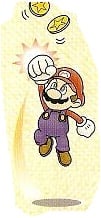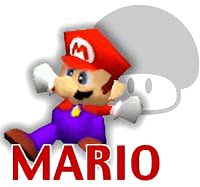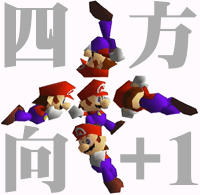Mario (SSB)
| Mario in Super Smash Bros. | |
|---|---|
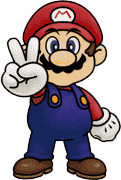 
| |
| Universe | Mario |
| Other playable appearances | in Melee in Brawl in SSB4 in Ultimate |
| Availability | Starter |
| Tier | B (7) (North America) ? (6) (Japan) |
Mario (マリオ, Mario) appears as a starter character in Super Smash Bros. He is considered an "all-around" fighter (like in most games) due to his relatively balanced attributes, a trait that has carried on with him in subsequent games.
Mario is voiced by Charles Martinet, who reprises his role from Super Mario 64 through re-purposed voice clips.
Mario ranks 7th on the tier list, in the B tier. As an all-rounder character, Mario generally has a great balance of offensive and defensive capabilities. He has a strong combo game, including a versatile down aerial (that can easily lead into an up aerial to continue the combo, an up smash as a finisher, or itself offstage to drag opponents down) and his up tilt (which can chain into itself at moderately low to moderate percentages), as well as among the best edgeguarding abilities, with powerful forward and back aerials that can also space against opponents easily, down aerial meteor smash with extremely low set knockback, and a powerful down smash that can easily cover edge options and rolls. To further compliment his offstage game, he also has one of the few good recoveries in the game; despite a moderate falling speed and low air speed, his Super Jump Punch gains some good distance while being relatively quick, and he also has an additional option in his Mario Tornado, which can even meteor smash a careless edgeguarder on the last hit. Mario has numerous additional tools, including a projectile in his Fireball, a very powerful finisher in his up smash, and useful throws, with his back throw being especially powerful.
Mario, however, has limited range compared to characters tiered higher than him, with issues in the hitboxes of his tilts and aerials. He also has poor mobility, with subpar walking and dashing speeds, and a low air speed, also slightly limiting his combo ability. In addition to this, his recovery, despite being good, is on the more predictable side against most characters, with his Super Jump Punch and Mario Tornado traveling in a linear way that isn't too difficult to attack out of.
Overall, Mario has the tools to take on any character. He is also considered to be slightly better in the Japanese version due to the changes to SDI.
Attributes
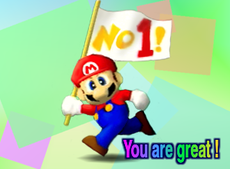
Mario is considered to be the balanced character. His stats are overall average to slightly subpar, with average weight, size, falling speed, and traction and below average walking, dashing, and air speeds as well as a subpar jump. He overall has a good combination of low power and high power attacks, giving him a pretty strong combo ability with many options, yet a variety of KO moves and options. He also has a projectile in his Fireball, that is a decent way to prevent opponent approaches due to falling downward while moving forward if used in the air. On the ground, it travels too slowly (along with the move's ending lag) to be effective however.
Mario's down aerial, a drill kick, is an excellent damage racker, being able to combo straight into an up aerial or itself (if offstage or high enough). It, being a meteor smash with consistently low knockback, is a rather effective way to gimp opponent's recoveries, and isn't of very high risk to use offstage due to Mario's good recovery. Mario's short hopped down aerial to up aerial combos are usually considered the best way to rack damage at base to low percentages, when his up tilt has too much ending lag to combo efficiently. His up tilt can chain into itself easily at moderate or close to moderate percentages, can combo into aerials, and is an effective move to use for juggling along with his up aerial. Mario's up smash and back throw are very powerful KO moves, with the former being able to KO on Dream Land as low as 73%, and being able to be combo'd into with a short hopped Z-cancelled down aerial, and the latter easily being able to garner KOs or at least set up edgeguards when used near the edge. His down smash is also a powerful move, with its two hits being spread out over a somewhat long duration, allowing it to easily read defensive options such as rolls, and also being able to hit characters on the edge. Even his forward throw and forward smash, weaker than his main KO moves, are strong enough to be able to KO near the edge.
Mario also has one of the best offstage games. His forward aerial consists of multiple hitboxes, with the last few being able to semi-spike, while it and his back aerial are solid KO moves due to their speed, range, and power. Both can also be used for spacing efficiently. His down aerial can drag opponents down if used repeatedly, as it is a meteor smash with extremely low set knockback, though it isn't very fast, meaning characters with better recoveries (mostly Pikachu, other Marios to a lesser extent) are able to escape. His neutral aerial, while inferior to back and forward aerials in terms of power, may be used to edgeguard whenever Mario is in the situational position to use it after a combo. Fireball, his neutral special, can also be used to gimp opponents with linear recoveries. Super Jump Punch and Mario Tornado also grant Mario a good recovery (though the latter requires quick button mashing), especially vertically, and while both moves travel in a linear way, Mario Tornado can be used at different times to mix up his options and make his recovery less predictable. It can also add to Mario's incredible edgeguarding prowess, being capable of very powerfully meteor smashing, which can be used effectively against foes recovering high.
Despite his advantages which compensate for his disadvantages, Mario still has some weaknesses that prevent him from being in the higher tiers. His attacks generally have short range, allowing many characters to outspace and outcamp him easily, particularly ones with some disjointed moves (most notably Kirby, Pikachu, and maybe Fox). He also lacks a reliable way to deal with projectiles, which combined with his poor mobility, gives him difficulty approaching characters such as Fox. Mario's attacks also aren't very fast, with his best finisher (up smash) having major ending lag, and only very few of his moves (such as up aerial) having notably fast startup. Mario also isn't too good at dealing with pressure due to his poor mobility, though he has good OoS options.
Differences between game versions
In his transition to the NTSC-U version, Mario got a mix of buffs and nerfs, but was slightly nerfed overall due to the higher SDI presence. Nevertheless, he is still considered to be viable in competitive play.
Attributes
 Mario is bigger (1.0x → 1.12x). This improves his range but makes him easier to hit.
Mario is bigger (1.0x → 1.12x). This improves his range but makes him easier to hit. Mario's head is skinnier (Y stretch: 160 → 140), making his head hurtbox a bit smaller. However, he is still slightly taller overall due to his larger model size.
Mario's head is skinnier (Y stretch: 160 → 140), making his head hurtbox a bit smaller. However, he is still slightly taller overall due to his larger model size. Rolls travel farther due to Mario's larger size.
Rolls travel farther due to Mario's larger size.
Special attacks
 Fireballs do more damage (6% → 7%).
Fireballs do more damage (6% → 7%). Fireballs travel a longer distance.
Fireballs travel a longer distance. Fireballs have less knockback (22 (base), 50 (scaling) → 10/25).
Fireballs have less knockback (22 (base), 50 (scaling) → 10/25). Super Jump Punch covers more distance due to Mario's larger size.
Super Jump Punch covers more distance due to Mario's larger size.
Moveset
For visualization's on Mario's hitboxes, click here.
| Name | Damage | Description | ||
|---|---|---|---|---|
| Neutral attack | Left Punch (左パンチ) / Right Punch (右パンチ) / Kick (キック) | 2% | Mario performs two quick jabs followed by a kick. Due to the speed of his first jab, Mario can perform a jab grab. This combo is taken directly from Super Mario 64. | |
| 2% | ||||
| 4% | ||||
| Forward tilt | ↗ | Middle Kick (ミドルキック) | 14% | Kicks straight forward. Can be angled up or down and it can used for spacing but rarely used due to Mario having better options. Comes out fast with decent range and power, although it has high ending lag. |
| → | 13% | |||
| ↘ | 12% | |||
| Up tilt | Uppercut (アッパーカット) | 10% | Performs a spinning uppercut. Mario twirls and punches upwards. Above average knockback scaling for a tilt attack, allowing it to KO at extremely high percentages. It does have low base knockback, meaning it can easily chain into itself or combo into other aerials at around moderate percentages. The move has high ending lag however, which makes the move punishable on hit at lower percents when combined with its low base knockback. | |
| Down tilt | Spinning Kick (スピニングキック) | 12% | Does a sweep kick forward. Has decent power and surprisingly great range, although it has fairly high ending lag, limiting its effectiveness outside of gimping recoveries in very specific situations. | |
| Dash attack | Slide (滑り台) | 12% (clean), 10% (late) | Does a sliding tackle, taken from Super Mario 64. Above average ending lag and not many followup options. If Mario does this move while holding a battering item, he will instead do a body slide, also from Super Mario 64. | |
| Forward smash | ↗ | Smash Punch (スマッシュパンチ) | 18% | Punches in front of him, his fist enlarging as he does so. Medium speed and average power for a forward smash, though it is slower than his up and down smashes and back throw. |
| → | 17% | |||
| ↘ | 16% | |||
| Up smash | Lead Headbutt (スマッシュヘッドバット, Smash Headbutt) | 19% | Headbutts upwards. His whole head becomes intangible for a period of time and it has a very large disjointed hitbox, with extremely high vertical knockback, being one of the strongest up smashes in the game (tied with Luigi's Donkey Kong's and Jigglypuff's). Its high ending lag and somewhat short range horizontally limits its effectiveness however. | |
| Down smash | Double Kick (ダブルキック) | 17% | Twirls around while breakdancing on both sides. A good KO/edgeguard move, also a decent way to space. Usually used to punish techs/rolls. | |
| Neutral aerial | Mario Kick (マリオキック) | 14% (clean), 11% (late) | Performs a sex kick. It gets weaker the longer it's out, though when it first comes out, it is a good finisher (though weaker than his forward and back aerials). One of the better neutral aerials overall in the game due to its frame 3 startup and long lasting hitbox. | |
| Forward aerial | Forward Dropkick (前方ドロップキック) | 16% (clean), 10% (late) | Performs a forwards spin kick. Has slow startup lag but it has a decently powerful hitbox when it first comes out. Highly useful against the majority of recoveries in the game. Can combo easily at moderate percentages. | |
| Back aerial | Backward Dropkick (バックワードキック) | 16% (clean), 10% (late) | Performs a backwards kick. Similar to forward aerial except it has slightly lower startup and a shorter lasting hitbox. Good for edgeguarding, and has good power. | |
| Up aerial | Air Slash (エアスラッシュ) | 12% (clean), 9% (late) | Performs a flip kick. It comes out on frame 2, making it the fastest aerial in the game in terms of startup lag (along with Luigi's up aerial). Knockback direction depends on which angle the foe was hit on. Lower power than most of his moves, but an effective juggling and combo move. | |
| Down aerial | Drill Kick (ドリルキック) | 3% (hits 1-8), 24% (total) | Performs a downward drill kick, 3%/hit, up to 8 hits for a total of 24%. A useful meteor smash; Similar to Jigglypuff's down aerial, it can be used multiple times to ensure that the foe is unable to recover. It has slow startup lag but minimal ending lag compared to other drill kills. Can combo into itself and up aerial easily. It also has solid shield pressuring potential due to its low ending lag. Like other drills, it is heavily SDIable, however. | |
| Grab | Grab (つかみ) | — | ||
| Forward throw | Forward Spin Throw (前方スピンスロー) | 12% | Performs a Spin throw forward. He quickly swings the foe once and tosses them in front of him. A standard forward throw with decent knockback, though back throw is usually better for KOs. Can easily get opponents offstage. Also usable to chaingrab in the "tent" portion of Hyrule Castle. | |
| Back throw | Airplane Swing (ジャイアントスイング, Giant Swing) | 16% (throw), 10% (collateral) | Grabs opponent by the legs and swings them until release (similar to his Super Mario 64 Bowser throw). It has standard knockback for a back throw, being a very reliable finisher. The throw is slow, although Mario's opponent has a hitbox while he spins them around. | |
| Forward roll Back roll |
— | — | ||
| Techs | — | — | ||
| Floor attack (front) Floor getups (front) |
6% | Gets up and spins. | ||
| Floor attack (back) Floor getups (back) |
6% | Gets up and spins. | ||
| Edge attack (fast) Edge getups (fast) |
6% | Gets up and flips. | ||
| Edge attack (slow) Edge getups (slow) |
6% | Slowly gets up and punches. | ||
| Neutral special | Fire Ball | 7%, 6% (NTSC-J) | Throws a fireball, which travels forward and loses momentum with each bounce. Because of this, they are best used in the air, and at higher locations. They can be spammed, though with some difficulty (and at a slower rate of fire than Luigi's), and are a decent approaching tactic. The move can be more efficient when used in the air, falling to meet the enemy at ground level, while still moving, and negating lag. | |
| Up special | Super Jump Punch | 5% (hit 1), 1% (hits 2-8), 3% (hit 9), 15% (total) | Does a jumping uppercut, which causes damage and makes coins fly out of the opponent. Can rack up damage. Mainly used for recovery, with great vertical range and decent horizontal range if aimed forward. Can also be used OoS and as a combo breaker due to its frame 2 startup lag (where Mario is also intangible). | |
| Down special | Mario Tornado | 1% (hits 1-14), 14% (total) | Does a spinning tornado attack, resembling the Spin Jump from Super Mario World. Has set knockback. If the lower segment of the final hitbox lands successfully, the move is a meteor smash. If the B button is pressed repeatedly in midair, Mario will rise upwards. Has no startup lag, although the opponent can easily escape the move. | |
Announcer call
English/Japanese/Chinese
French
German
On-screen appearance
- Jumps out of a Warp Pipe, similar to his entrance from the beginning of Super Mario 64.
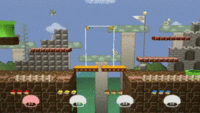
|
|---|
Taunt
- Puts his arms by his sides and grows, as if receiving a Super Mushroom. He shrinks shortly after. It is a rather long taunt (the longest in the game), so it is often used sparingly. Mario's taunt can be immediately canceled when he starts to shrink by using the Z button.
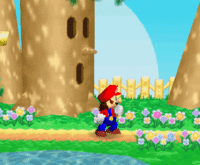
|
|---|
Crowd cheer
| Cheer (International) | Cheer (Japanese) | |
|---|---|---|
| Cheer | ||
| Description | Mario! *claps 3 times* | Ma - *clap* ri - o! *clap* |
Victory poses
- Jumps and turns around simultaneously with one arm in the air (also his character selection animation).
- Spins one arm and punches the screen, saying "Here we go!".
- Hops thrice to the right then stops in front of the screen.
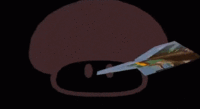 |
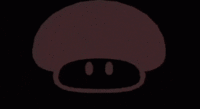 |
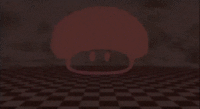
|
|---|
In competitive play
Most historically significant players
- See also: Category:Mario players (SSB)
Czar - One of the most prominent Mario players in all of Smash 64. He notably placed 5th at Super Smash Con 2015, defeating Josh Brody and Mercy with Mario. He additionally marked some of the highest major placements while solely using Mario, with 7th at Keystoned V and 13th at Boss Battle 3. He is commonly ranked as the best Mario player in recent years, peaking at 34th on the 2019-2020 Smash 64 Power Rankings.
FAUST - The best Mario player from Japan, but has since been inactive. Has done well playing Mario at events such as 4th at Kanto 2016 where he beat Shizuku, and two other top 12 placements at Kanto 2014 and Kanto 2017.
Fireblaster - A high-level Yoshi player who previously used Mario as a co-main. He played both characters in sets shown with his wins against Mercy and LD at Super Smash Con 2015 where he placed 5th. He has also made other top 8s such as 5th at Shine 2017 and 7th at Apex 2015 using both characters. He was previously ranked 36th on the 2019-2020 Smash 64 Power Rankings.
Fruity - One of the most notable European Smash 64 players. Placed 7th at B.E.A.S.T 7 with solo Mario, as well as 2nd at Vivaldi Autumn and Brussels Smash 64 Meetup using him as a secondary. He is also active in online weeklies, being ranked 2nd on the February 2023 Online All-Time European Smash 64 Power Rankings.
Hydra - One of the best solo Mario players in the United States alongside Kimimaru. Most notably placed 5th at Snosa IV where his tournament run included wins over Darkhorse, SOMBRERO, and cobr. He also made major placements with 13th at Snosa III and 17th at GENESIS 5. Previously ranked 59th on the 2017 64 League Rankings before becoming mainly inactive since early 2019.
Isai - One of the best Smash 64 players of all time who is efficient with the entire cast. Notably placed 2nd at Apex 2013 with solo Mario, beating KeroKeroppi, Kikoushi, and Ruoka Dancho at the tournament. His Apex run remains the highest Mario result seen in the history of Smash 64. He has used the character again at many tournaments such as his 1st at Keystoned V and 5th at Snosa 5.
Kimimaru - One of the best solo Mario players in the United States alongside Hydra. Placed 9th at both Snosa III and GENESIS 5, and 17th at GENESIS 3 with overall wins over Shihman, SotoH, and NaCl. Previously ranked 41st on the 2017 64 League Rankings before becoming mainly inactive since early 2018.
Nintendude - Considered one of the best Mario players in the United States before switching to Fox. He notably went solo Mario at 9th at Apex 2013, as well as 4th at Zenith 2013 and 13th at Apex 2014 as one of his characters. He took sets over LD and Josh Brody back when he mained the character.
Tier placement and history
Mario was originally seen as a decent character in the early metagame, where he was ranked at 7th of middle tier on the first list. This time period includes Mario's best representation with Red, a Japanese Mario player that was the character's best representative during the late 2000s, and Nintendude who played frequently well with the character in North America during the early 2010s. Afterwards, Mario's strengths were reevaluated even further, this was due to Isai's run at Apex 2013 and the rise of solo-Mario players such as Czar and Japan's new best Mario player, FAUST. He rose to 5th place of the second and third official tier list, seen as a character who had the capabilities to go even with higher-tier characters such as Kirby and Captain Falcon. While he lacked the oppressive neutral and advantage state such as the top tiers, Mario commonly worked as a decent co-main seen with players such as Fireblaster who was put in contention for one of the best Mario players in the world by the mid-2010s. Both Fireblaster and Czar would hit one of the character's best peaks since Isai's Apex 2013 run with supermajor Super Smash Con 2015, placing 5th with Mario as their headline character.
However, in the years since the third tier list, some of the most notable Mario mains such as Nintendude and Fireblaster dropping them completely in favor of solo-maining better characters. Despite this, other solo-Mario mains such as Hydra and Kimimaru who had very solid Snosa and GENESIS runs during this time. Additionally, Czar would be ranked the highest out of any Mario player on the 64 League Rankings on multiple occasions during the late-2010s. Despite this, Mario's metagame was not evolving at the same rate as characters such as Yoshi and Jigglypuff who were boasting better results and a larger playerbase. This would result in Mario dropping back down to 7th in B tier, the same place he landed on the first tier list. In the current meta, most of the best Mario players are currently on hiatus or fail to make notable leeway at some of the biggest Smash 64 tournaments of the year. However, the character has seen better chances regionally, shown with SuPeRbOoMfAn winning Crovy Fest and JaimeHR placing 2nd at Battle At The Border '23. As such, it has shown that Mario's all-rounder abilities still make them a solid character in the grand scheme of Smash 64, but has made rarer appearances at top level due to the fact that he has been outclassed by many characters.
Techniques
Tornado recovery
Mario can gain vertical distance during the Mario Tornado if the special button is mashed often enough during the attack animation, similarly to the Luigi Cyclone. However, the button must be mashed much faster than with Luigi due to Mario's faster falling speed and slightly lower maximum height that can be reached from his down special.
Mario Bros. "pseudo-spike"
Both Mario and Luigi can "spike" an opponent by repeatedly using their down aerials on the opponent when off the edge and then taking advantage of their huge vertical recoveries to get back to the stage. This does not work against Pikachu, who has a much longer and faster vertical recovery than either Mario or Luigi.
Jab grab
Mario is one of four characters (along with Pikachu, Ness, and Luigi) that can perform the jab grab, an exploit that allows increased shield pressure. Mario can exploit the high shield stun by jabbing, then immediately jab cancelling using a grab.
In 1P Game
In the game's single-player mode, a player and a randomly chosen ally fight against Mario and Luigi in a team battle on Peach's Castle. If the player hasn't dealt any damage to Mario before defeating Luigi, the player will be awarded with the Bros. Calamity bonus, which is worth 25,000 points.
Later on in the single-player mode, Metal Mario, a metallic incarnation of Mario (introduced in Super Mario 64), is featured as a "boss character" in Meta Crystal. He is not merely a heavier texture-swap of Mario, as his attacks also deal much more knockback.
Description
From the Game
Although best known as the mustachioed plumber who battles the Turtle Tribe with his distinct jumping action, this internationally famous hero has also acted as a referee, a driver, and even a doctor! He's been linked to Princess Peach of the Mushroom Kingdom for years, but to this day their true relationship remains a mystery.
Works:
- Super Mario Bros. (NES)
- Super Mario Kart (SNES)
- Mario Kart 64 (N64)
Alternate costumes

| ||||
Trivia
- Mario's artwork pose has him holding up a V sign, as he did in several older games such as Super Mario World; the pose is similar to a piece of official artwork from Super Mario Bros. 2.
- Mario's portrait on the character selection screen is based on one of his renders from Super Mario 64.
- Mario is the only character who speaks in one of his victory poses (the line being "Here we go!").
- In several images on the Japanese Super Smash Bros. website, Mario's default costume's overalls seem to have a tint of purple to them, similarly to Luigi's. This was changed in the final game.
- in the game's system debug menu, FGM 437 is an unused voice clip of Mario saying "Let’s-a go!", which is recycled from Super Mario 64.
| Fighters in Super Smash Bros. | |
|---|---|
| Fighters | Captain Falcon · Donkey Kong · Fox · Jigglypuff · Kirby · Link · Luigi · Mario · Ness · Pikachu · Samus · Yoshi |
